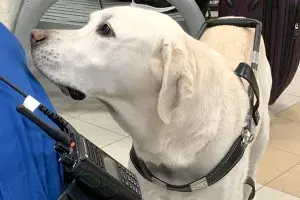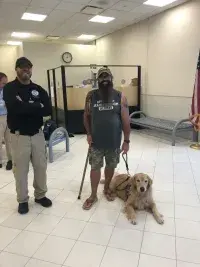 Nick, a Southeastern Guide Dog, works while his owner, Larry Newman, a passenger with visual impairments, gets a pat down. (Photo by Lillian Newman)
Nick, a Southeastern Guide Dog, works while his owner, Larry Newman, a passenger with visual impairments, gets a pat down. (Photo by Lillian Newman)
Wyatt Rhoden has been in the TSA National Explosives Detection Canine Team Program since 2010. He spent his first 12 years as an Explosives Detection Canine Handler and the last year and a half as the Canine Supervisor at Southwest Florida International Airport (RSW). His passion and affinity for dogs put him on an active path to be involved with Golden PAWS Assistance Dogs and Southeastern Guide Dogs Inc.
Chance encounters with Golden PAWS in his hometown of Naples, Florida, introduced Rhoden to the nonprofit. The organization promotes independence for combat-wounded veterans, first responders and children with life-changing disabilities through partnerships with skilled assistance dogs.
Being a U.S. Air Force veteran himself, Rhoden immediately identified with their mission and began talking with Tom Storrar, a retired Collier County sheriff captain and one of Golden PAWS Assistance Dogs volunteer handlers. From that humble start, Rhoden has built multiple community outreach events at RSW, offering TSA Cares information and service dog familiarization to local nonprofit organizations that provide service dogs to people with disabilities.
“There can be many triggers with air travel, as many veterans flew into combat zones while serving,” said Golden PAWS volunteer PJ Harris. “Our relationship with RSW TSA and Wyatt’s crew is so strong. They welcome our training sessions and work hard to accommodate us and our recipients. At Golden PAWS Assistance Dogs, we try to prepare our recipients to handle a variety of experiences, and conquering travel is a huge accomplishment.”
“There’s a whole lot going on at the checkpoint, and it can be stressful for passengers and their guide or service dogs,” said Rhoden. “The veteran has to produce his ID to the travel document checker. Then they’re funneled into a tight space where bins are clanking around, people bend down to take off their shoes and push their stuff through the X-ray. This training helps relieve stress by acting as a trial run for the guide dogs and their handlers and helps them get comfortable with the process.”
Rhoden uses a dedicated lane and staffs it with passenger support specialists who also benefit by meeting with the human and canine partners.
“The Officers learn how to approach service dogs and what to say to the owners,” said Rhoden. “Before they reach down to check the dog’s collar or harness, they can ask the owner, ‘Is it okay to touch your dog’s collar/vest and would you like to put your dog into a sit first?’ since the dog is on duty for the passenger while on the checkpoint.”
Other stakeholders have bought into the coaching opportunity, too. During one of his quarterly training events, a Southwest Airline manager offered to host an aircraft training day and allowed a group of service dog teams on an empty plane for instruction.
“For the next training, after processing through the checkpoint, we went down the concourse onto an aircraft to practice boarding and sitting in the seats with the service dogs snug against the bulkhead,” said Rhoden. “Airline reps gave strategies and tips about reserving Americans with Disabilities Act seats and what to ask the gate agents. That was really cool.”
“We are truly honored to have TSA and Wyatt work with Golden PAWS, helping our veterans get comfortable with air travel,” said Harris. “He works with his staff, putting our recipients at ease, as well as helping them understand how to navigate the process.”
Southeastern Guide Dogs Inc benefited from this customer service program as well.
“What a great opportunity this has been,” said Southeastern Guide Dogs Inc volunteer puppy raiser Brenna Yuknis. “Taking the puppies through the TSA checkpoint is such a wonderful training opportunity. It really helps the puppies with their service dog training to be able to go through these real life simulations to familiarize themselves and to experience all the sights, sounds and smells. It was fantastic.”
“I believe that by giving back, you have the power to positively impact the lives of individuals, families and even entire communities,” said Rhoden. “My hope is that by facilitating this training, passengers with disabilities will travel with confidence knowing that their experience, alongside their service dogs, will be seamless, granting them the same freedoms of air travel as enjoyed by everyone else.”
By Karen Robicheaux, TSA Strategic Communications and Public Affairs



